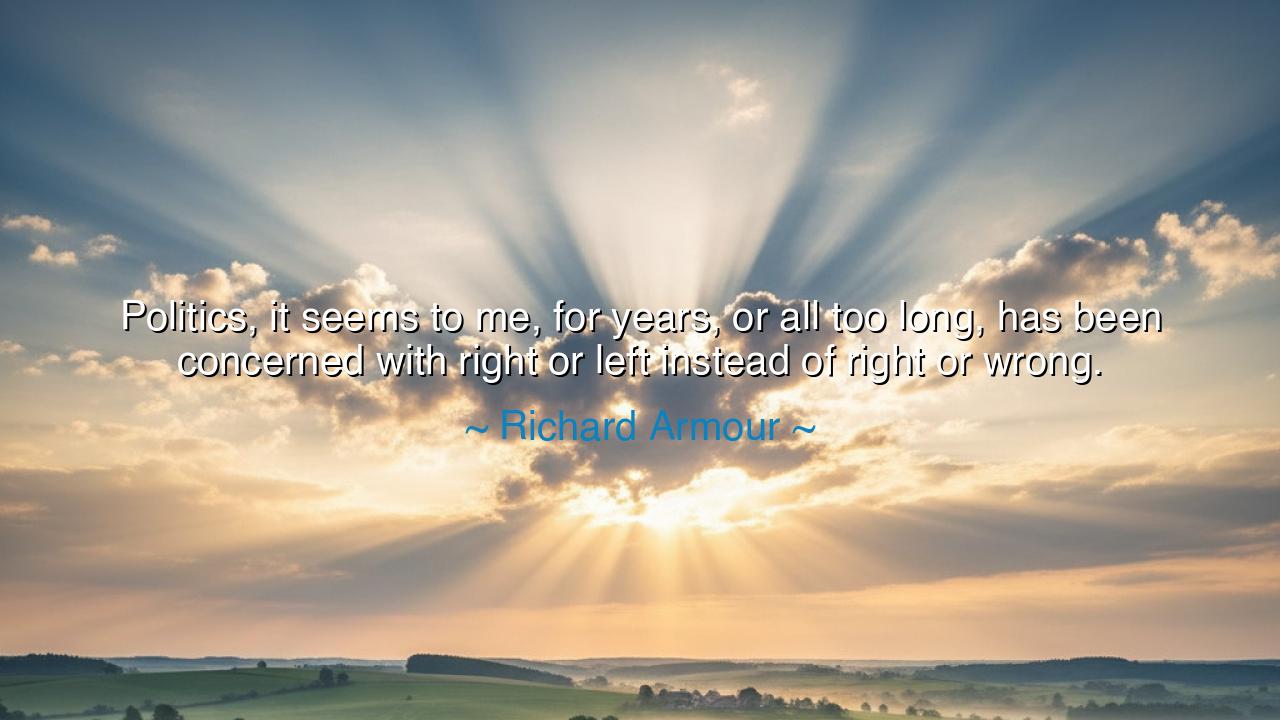
Politics, it seems to me, for years, or all too long, has been
Politics, it seems to me, for years, or all too long, has been concerned with right or left instead of right or wrong.






The words of Richard Armour — “Politics, it seems to me, for years, or all too long, has been concerned with right or left instead of right or wrong.” — cut through the fog of partisanship like a blade of truth. Armour, a poet and humorist, clothed his wisdom in wit, but his lament is timeless: that public life has become obsessed with sides, factions, and labels, while the deeper duty of discerning right from wrong has been neglected.
The meaning is both tragic and stirring. When politics is reduced to right or left, it becomes a game of loyalty, of cheering for one banner against another, regardless of principle. But when it is elevated to the higher measure of right or wrong, it becomes what it was meant to be — the pursuit of justice, fairness, and the common good. Armour’s cry is a rebuke to every age where men worship party more than truth.
History shows us the danger of forgetting this. In the years before the American Civil War, debates over slavery were divided between North and South, Democrat and Republican, yet the deeper issue was not geography or party but morality. Was it right or wrong to treat human beings as property? Too many clung to their “side” rather than to justice, and the result was war. Here Armour’s words find tragic fulfillment: when sides matter more than truth, nations bleed.
Yet history also gives hope. When Nelson Mandela rose in South Africa, he did not simply speak for one faction, one race, or one ideology. He sought what was right, calling for reconciliation, forgiveness, and equality. Though he had every reason to divide his people into “us” and “them,” he chose instead to rise above right or left, and to hold fast to right or wrong. His legacy remains as proof that politics can be noble when it is tethered to moral clarity.
Let this wisdom endure: do not be deceived by the false idols of right or left. Labels shift, banners fade, but truth remains eternal. Armour’s words are a summons to rulers and citizens alike: weigh every choice not by its place on the spectrum of partisanship, but by its alignment with justice. For a people who forget the difference between sides and principles will wander in blindness, but a people who cling to right and wrong will endure in light.






HNHuyen Nguyen
Armour’s statement resonates with me, especially in today’s politically charged climate. It seems like we’ve lost the ability to critically examine policies based on their moral standing, and instead, everything is framed in terms of party loyalty. Is this polarization detrimental to the progress of society? How can we bring the focus back to ethical governance, where policies are judged on their merits, not political agendas?
HNHi Ne
I love how Armour points out the problem with focusing on ‘right or left’ instead of ‘right or wrong.’ It feels like modern politics is more about winning than doing what’s ethically sound. How can we push politicians to make decisions based on integrity and the greater good, instead of party loyalty? Is there a way to bridge the divide and encourage more bipartisan cooperation for the benefit of society?
TN19.Duong Thi Tuyet Ngan
This quote makes me think about how politics has shifted from ethical discussions to partisan debates. When did it become more about defeating the opposition than doing what’s right? How do we create a political environment where decisions are based on moral considerations, rather than political gain? Is it even possible to shift the focus back to right versus wrong in a highly polarized world?
QTDiem Quynh Tran
Richard Armour’s quote highlights a critical issue in today’s politics: the focus on party lines rather than moral principles. It’s easy to get caught up in the binary of left vs. right, but shouldn’t we be more concerned with what’s right or wrong, regardless of political affiliation? How often do we see decisions being made based on what’s best for the party rather than what’s best for the people?